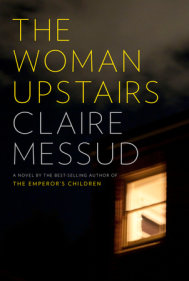The Woman Upstairs is so redolent of a Remains of the Day-type character in its
treatment of Nora, a woman who exists on the edges of other peoples’ lives, that
I rarely thought of Nora by name. Was she a third grade teacher living a quiet,
orderly life? Or was she the mad woman in the attic alluded to in the title’s
homage to Bertha in Jane Eyre? Nora,
herself makes the comparison, “People don’t want to worry about the
Woman Upstairs,” she reflects. “Not a soul registers that we are furious. We’re
completely invisible.”
So Nora
lives an invisible life, yet we know she’s angry. She’s told us so on the very
first page of the novel. “How angry am I?
You don’t want to know. Nobody
wants to know about that. I’m a good
girl, I’m a nice girl, I’m a straight-A, strait-laced, good daughter, good
career girl, and I never stole anybody’s boyfriend, and I never ran out on a girlfriend,
and I put up with my parents’ shit and my brother’s shit, and I’m not a girl
anyhow, I’m over forty fucking years old, and I’m good at my job and I’m great
with kids and I held my mother’s hand while she was dying and I speak to my father
on the telephone – every day, mind you. . . It was supposed to say “Great
Artist” on my tombstone, but if I died right now it would say “such a good teacher/daughter/friend”
instead. . .”
Thus
Nora begins her story by telling of the time five years previously when
everything shifted after she fell in love with the hybrid Palestinian/Lebanese/Italian
Shahid family when they arrived in Boston from Paris so father, Skandar, an academic
star, could spend a year at Harvard. Nora met them through their adorable son
Reza, her newest student, who was attacked by bullies. Reza’s mother, the aptly named Sirena, a “real”
artist, attracted Nora with her take-charge manner and the two soon shared
studio space where Sirena created an immense, alternate world. Meanwhile, Nora
was building tiny boxes, rooms, containing the lives of women artists. That she
began with Emily Dickinson and spent hours on the craft of carefully varnishing
Dickinson’s floor rather than on creating anything original spoke to her need to
focus more on Sirena than on anything of her own. Soon she and Sirena were
lingering over gourmet picnics and seemingly intimate conversations while a foreboding
sense of what might be ahead permeated the rose water-filled air.
Sirena
described the family’s trip back to Paris for the holidays, “I have a history there, and friends, and
colleagues; and home is where my boys are, of course. But do you know this idea of the imaginary
homeland? Once you set out from shore on your little boat, once you embark, you’ll
never truly be at home again. What you’ve
left behind exists only in your memory, and your ideal place becomes some
strange imaginary concoction of all you’ve left behind at every stop.” As Nora
sat listening, it was evident that she wasn’t yet ready to leave the shore, to
embark on her own life and that her identity was evolving into a strangely
imaginary concoction unmoored by reality.
At
times I was impatient with Nora’s lack of clarity and her inability to get out
of the quicksand of her life. I wanted
to skip past Messud’s brilliant turns of phrase and get to that black dog I
knew was lurking around the next corner. Regardless, all my expectations left
me emotionally unprepared for the awakening, the absolute tour de force of a
climax that the last pages delivered. What, I wonder, as I contemplate this
novel, exactly what, is unleashed when self-deception gives way to anger? This brilliant novel of envy, desire, invisibility,
betrayal, and emergence is one requiring patience as it evolves slowly yet
assuredly until it suddenly bursts from its cocoon.
Summing it Up: Read Messud’s quiet portrait of an
invisible woman who slowly emerges from her cocoon for its shimmering phrases
and for the seamless manner in which it builds toward the shattering
denouement. Stick with it; while the characters are difficult to like and
there are times when it could have moved more quickly – the ending, oh, yes,
the ending is worth it.
Rating: 4 stars
Category: Fiction, Gourmet, Book Club
Publication date: April
30, 2013
Reading Group Guide: http://www.randomhouse.com/book/209919/the-woman-upstairs-by-claire-messud#discussionquestions
What Others are Saying:
National
Public Radio: http://www.npr.org/2013/04/25/177962163/woman-upstairs-friendly-on-the-outside-furious-on-the-inside
New
York Times: http://www.nytimes.com/2013/05/05/books/review/the-woman-upstairs-by-claire-messud.html?pagewanted=2&_r=0

No comments:
Post a Comment